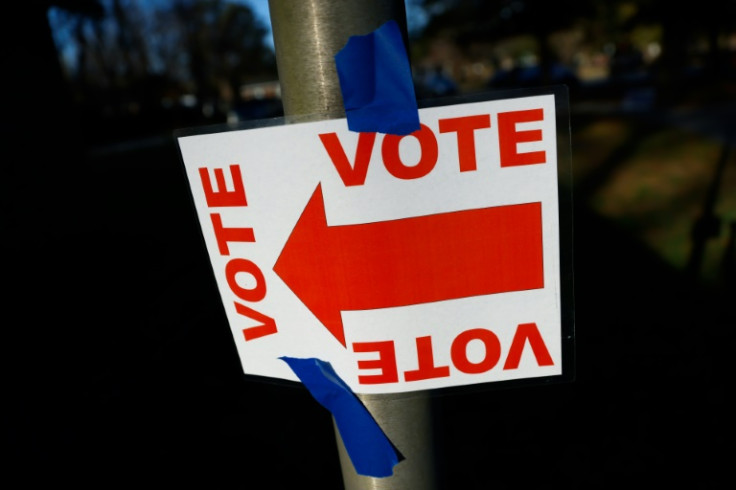
As the U.S. elections get closer by the day, the importance the Latino electorate will have at the time of tipping the scale is increasingly taking centerstage in the political conversation.
An estimated 17.5 million Latino voters expected to cast a ballot, 11.5% of the entire American electorate, according to a report by the National Association of Latino Elected and Appointed Officials (NALEO). Overall, more than 36.2 million Latinos are expected to be eligible to vote this year.

The figure means that this is not only the second largest demographic in the country, but their geographical distribution, concentrated in several battleground states, means they can have an outsized importance at the time of deciding whether Joe Biden or Donald Trump get a second term in the White House.
The candidates seem aware of this, with Biden launching a campaign push specifically targeting Latinos in mid-March, and Vice President Kamala Harris taking a trip to Puerto Rico as well. Trump, on his end, gave an interview to Univision late last year where he addressed the gains he's made with this electorate and explained why he believed this to be the case.
In this context, The Latin Times interviewed Clarissa Martínez-de-Castro, Vice President of UnidosUS's Latino Vote Initiative, to get her analysis of the current state of the demographic's electoral landscape.
The importance of registering people to vote, the need for parties to understand how to reach out to prospective supporters, something she said they are seemingly starting to get, are some keys highlighted by the high-ranking official of the nation's largest Hispanic civil rights and advocacy organization.
The following conversation was edited for clarity and length purposes
What is your analysis of the Latino electorate at the moment?
I think at least in terms of the conversation we are getting some attention. The elements for that were there for a long time, but they have definitely become more prominent. Latinos are now the second largest voting bloc, and because of where they're located they're gonna play an outsized role in terms of presidential outcomes and in terms of the balance of power in Congress. So there's a lot more attention being put on these voters right now, but there's still a long ways to go in terms of really speaking to the priorities of these voters and engaging with them in a very meaningful way.
Why do you think this is the case? Why is more importance being given to the Latino electorate at the moment?
I think that there's finally starting to be a little better understanding of these voters. But because we're a young population, there's always a couple of things happening. One is that every election cycle is going to have new Latino voters going to the polls. Candidates need to reach out to them to make sure they're introducing themselves to those voters and winning their support.
That also goes for voters who may not be voting for the first time, because this group has also had very little Outreach from the parties or the candidates. So when you combine that with the fact that there are razor-thin margins in a number of states that are going to be critical in deciding who gets to the White House and who controls Congress, people are looking at this electorate to see how to sway them.
On the Republican side, they'll want to see if they can prevent Democrats from getting more than the two-thirds support that they traditionally have gotten. Democrats, of course, will be trying to maximize the level of support they can get from Latino voters. So we are seeing earlier outreach happening this year certainly at the presidential level.
And why are Latinos being better understood now?
I think there's a little bit more research on these voters on the one hand. But for a very long time there's been a number of misconceptions and mistaken assumptions about this electorate. Some of them continue, and that's why have created a data hub.
One of the things we continually hear is the notion of our community being apathetic. Latinos are one of the communities with the highest labor force participation in our country. People are working hard. They're contributing to their communities. That is not an apathetic Community. What we are is unconvinced.
Part of that has to do with not building enough connections between parties and candidates with our voters. One of the things we know is that once registered more than eight in ten Latinos voted. So what we have is a have is a voter registration opportunity gap. And even though a lot of money is spent every year in every election cycle, very little of it is destined to help eligible Americans to register.
So what why organizations like us and many others are trying to do whatever we can to make sure that every last eligible voter is registered and can make its voice heard in the voting booth.
How do you do it? What is the field work needed to get more people registered?
One of the things we often hear from people is not necessarily that they are not interested, but nobody had approached them about it, or they don't know how to go about it. We have canvassing programs where people are invited to register. We also know Latinos navigate online a lot, so we have a digital program as well, particularly now that there's a variety of tools to help the voter wherever they might be located.
We have a tool called voter.org where people can go and start their voter registration process or is there already registered check the status of their voter registration. This is key because there are a lot of shenanigans with that.
How would you describe Latino voters at the moment?
We're seeing heavier support for Democrats among all Latino voters, but younger voters are still a little bit in between, trying to make up their minds. So especially with them, candidates matter, their positions matter and meaningful outreach is essential.
Different studies have shown this generation to be more anxious, with more mental health issues. They also consume less news. How do you think this pans out in terms of turnout? Does this makes it easier or harder to get them to vote?
I think it's a little bit of both. For example. Now that many of us feel more comfortable navigating things online. There's an opportunity to find information that way and it also gives groups like us an opportunity to reach people that are far away from where we may be physically and have a conversation. That creates opportunities.
Unfortunately, most things have a positive in a negative side. We also know that a lot of these online platforms are right. Vehicles for the spread of mis and disinformation and this is a dangerous in any context.
Talking about Latinos in general, polls have shown them to be more concerned about general issues like the economy, rather than perhaps more community-specific ones like immigration. Are these factors going to weigh more in their vote?
For many years candidates, if they even bothered to talk to Latinos, thought that the only thing they needed to talk to Latinos about with immigration. That's wrong. Then the pendulum swung the other way and when people started looking at data and seeing that immigration was not among the top issues then they said Latinos don't care about immigration. That is also wrong.
I think when people try to put us in an either or box chances are they're gonna get it wrong. Here's what is accurate: economic issues have always been top of mind for Latino voters and that's not a surprise. We are a very hard working Community. We have one of the highest labor force participation rates in the country.
Our second concern is wages. The cost of healthcare is third and the fifth also relates to the pocketbook: the cost of housing. So four of the top five priorities right now are related to that. The fourth top priority relates to concerns about gun violence, as the majority of Latino voters feel that it is just too easy to access guns and assault weapons.
Immigration is always there. Sometimes it breaks into the top five when things get really nasty. We might be seeing that come back. For example in 2023 immigration was at number six, which is not the top five, but it was higher than it was in 2022. We're likely to see potentially that issue move up on the priority scale. So again, it's not yes or no. Sometimes it's somewhere in between.
© 2025 Latin Times. All rights reserved. Do not reproduce without permission.






